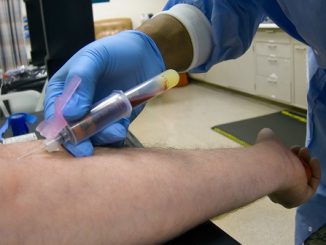
If a person charged with a crime is found to be HIV-positive, that could be enough for police to disclose that very personal and sensitive information to the public.
That’s one takeaway from an Ontario Court of Appeal decision that advocates say is cause for concern for those living with HIV or AIDS, which continue to attract stigma and misunderstanding despite evolving science.
The province’s top court overturned a lower court decision last week, ruling that that Durham Regional Police did not breach former youth pastor Kris Gowdy’s constitutional rights following his 2012 arrest for Internet child luring when they disclosed in a news release that he was HIV-positive.
Gowdy was arrested after arriving at the home of someone who had been posing as a 15-year-old boy online, to perform oral sex, only to discover the individual was a police officer. Police searched his car and discovered documentation and medication proving he was HIV-positive. The arrest and Gowdy’s HIV status were widely reported on at the time, making international headlines.
Writing for a unanimous three-judge panel, Justice David Watt said the police force’s actions in disclosing Gowdy’s HIV status were “clearly in retrospect not advisable.”
But the judges held that the release of that information did not violate Gowdy’s right to security of the person because there had been no finding at trial that the disclosure had a psychological effect on Gowdy beyond the impact already caused by the charge he was facing.
They also concluded that provincial privacy legislation contains an exemption for municipal institutions to release personal information that they have lawfully gathered if it is for a “consistent purpose.”
In this case, Watt said that the “consistent purpose” was to further the investigation “by inviting responses from other sexual partners of Gowdy” who may be at risk of transmission.
“The police had reasonable suspicion; reasonable grounds to believe further offences had been committed was not required for the purpose of the media release,” Watt said.
The court dismissed Gowdy’s appeal of the conviction, but allowed the Crown’s appeal. The court substituted Gowdy’s two-year conditional sentence, which he served at home, with a one-year jail term, although it said he should not be re-arrested because he had already served his sentence.
As noted by the Court of Appeal, the lead investigator in the case did not seek legal advice or the permission of the police chief or his designate before issuing the news release, did not seek medical advice to find out the likelihood of transmission of the virus through a sexual activity such as fellatio, and did not seek to confirm Gowdy’s assertion that his medication had rendered his viral load so low that it made transmission unlikely.
Gowdy also never admitted in his interview with police that he had had sexual contact with individuals who were unaware of his HIV status, the court said.
“The lead investigator testified that, to his knowledge, he had never before investigated someone with HIV in his 23 years of policing,” Watt wrote. “The investigating officer acknowledged he did not consider the Charter rights of Kris Gowdy before requesting the media release.”
Richard Elliott, executive director of the Canadian HIV/AIDS Legal Network, one of the interveners in the appeal, said in an interview with the Star that police should have turned their minds to what the actual risks of transmission may have been in this case.
“I can’t think what that ‘reasonable suspicion’ is actually founded on. I don’t think the suspicion is a reasonable one, all the information the officer had was that this accused was HIV-positive,” Elliott said.
“This is a case in which merely finding out someone has HIV was seen by police as sufficient for putting out a press release, basically engaging in a fishing expedition.”
He also described the court’s interpretation of the “consistent purpose” exemption as “very, very liberal,” saying it sets an “extraordinarily low bar” that police have to clear before releasing a person’s HIV status.
The case highlights what advocates say is a lack of proper training for officers in dealing with HIV-positive individuals and the absence of clear statutes governing the disclosure of such information by police.
Durham police spokesman Dave Selby declined to comment on the court’s decision.
“In general, I can say that we regularly review our policies to ensure they are consistent with all applicable laws and judicial decisions. We will review this decision carefully, as well,” he said in an email. “We will continue to respect the fundamental privacy rights of all citizens while balancing our community safety responsibilities.”
Gowdy’s appeal lawyer, Russell Silverstein, said his client is considering whether to seek leave to appeal to the Supreme Court of Canada.
“When it comes to one’s HIV status, different considerations apply, it’s not the same as telling the world that the accused is suffering from cancer or some other disease,” he told the Star.
“You can’t say that the release of such information is per se a Charter breach, it’s going to depend on the circumstances, and the question is: what should the appropriate test be for the disclosure of that particular information?”
A former pastor with the Free Methodist Church of Canada, Gowdy posted an ad on Craigslist in 2012 looking for men interested in receiving oral sex, specifying he was looking for “under 35, jocks, college guys, skaters, young married guy.”
A detective with the OPP’s Child Sexual Exploitation Section homed in on the use of the words “young,” “skater,” and “under 35” in Gowdy’s ad, and began an online conversation with him, posing as a 15-year-old boy.
Shortly after agreeing to meet the “boy” for oral sex, Gowdy was arrested. He maintained in court that he never actually believed the person he was conversing with was 15 years old.
Gowdy, a former pastor with the Free Methodist Church of Canada, had kept his sexual orientation secret from his family and church, his 2014 trial heard. He had no prior criminal record and there were no complaints about inappropriate behaviour from the ministries where he had worked as a pastor.
“I regret incredibly my actions, they were foolish and inappropriate,” Gowdy told the Star in an interview in 2014. “It feels to me like there should be some kind of reprimand to these officers at the minimum.”
At trial, Justice Michael Block found that the release of Gowdy’s HIV status violated his constitutional rights. He circumvented the mandatory minimum sentence of one year in jail for the luring offence, and instead imposed a two-year conditional sentence, which Gowdy served at home. Gowdy’s name was to remain on the sexual offender registry for 20 years.
“Mr. Gowdy had a right to make his own choices concerning the disclosure of his HIV status,” Block said. “No doubt he would have chosen his own method and different timing if he ever determined to inform those near to him. Absent evidence of serious risk of transmission and rigorous compliance with statute, no one had the authority to make that decision for him.”
By JACQUES GALLANT





Be the first to comment